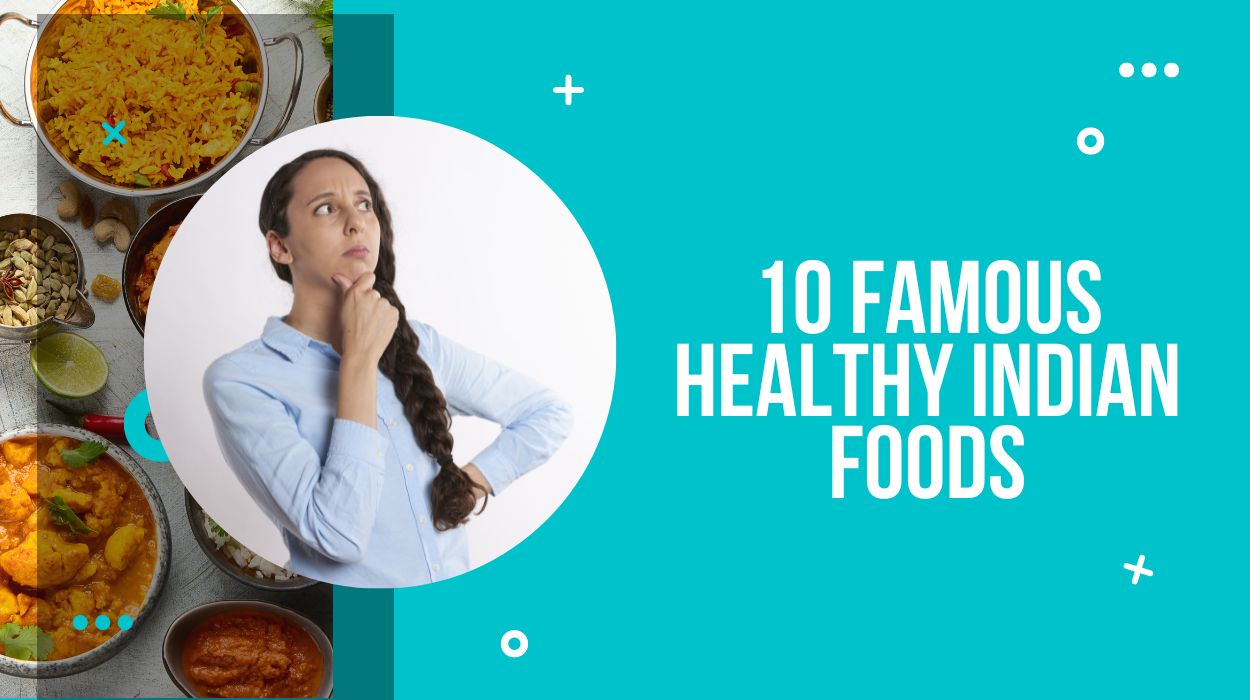Healthy food in Indian households might seem a little out of reach, considering the new wave of “healthy diets” trending right now. Indian food, undoubtedly, is cooked in copious amounts of oil, butter, ghee, etc. However, that does not have to be the case all the time.
When cooked with adequate measurements, Indian food can change the way healthy food appears and tastes!
This article talks about ten famous and healthy Indian foods that are flavorful and nutritious. Read on to know more!
10 Famous Healthy Indian Foods
1. Steamed Brown Rice
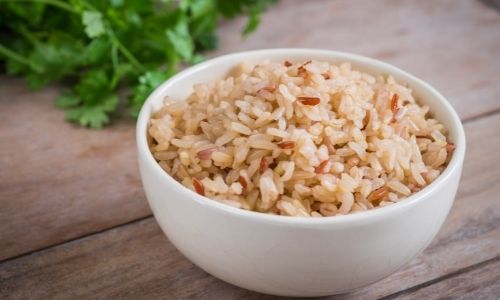
Rice is readily available and widely used across every household in India. In fact, in some southern and northeastern states, rice is considered a staple food.
While white rice is not the healthiest choice, brown rice is! In comparison, brown rice contains higher energy calories, protein, fibre, etc.
Moreover, steamed brown rice is more filling and helps nourish your gut. In turn, this helps you manage and control your weight effectively.
For taste and added nutritional value, you can combine steamed rice with any daal or vegetable curry.
2. Daal (Pulses)
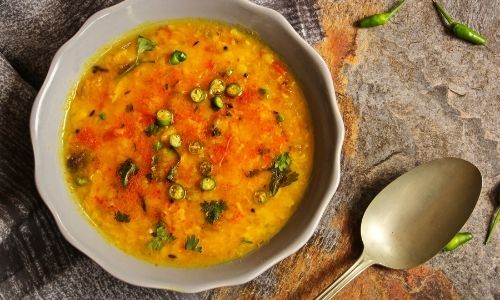
Pulses, locally known as daal, are available at almost every grocery store. Because so many Indians eat daal every day, they are reasonably priced.
Daal is beneficial, especially for vegans and vegetarians, as they can not consume animal-based protein.
Pulses are nutrient-dense Indian foods. Known for their high protein value, they also contain dietary fibre, vitamin B6, and folate.
Therefore, adding daal to your diet ensures proper digestion of food, avoids constipation, strengthens immunity, and improves the functioning of red blood cells.
3. Roti / Chapati / Phulka
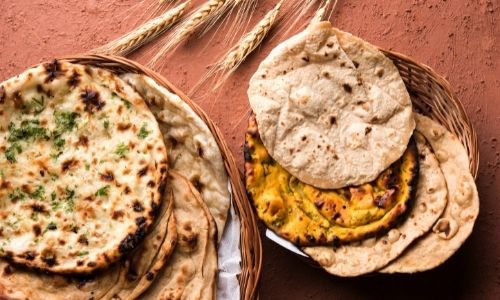
Just like steamed rice and daal, Roti is another addition to staple Indian foods that are healthy!
Rotis are generally considered unhealthy for two main reasons – the type of flour used and the amount of clarified butter added on top for taste.
Wheat flour is the most accessible flour for purchase. However, you can switch to healthier alternatives such as multigrain, Bajra, Jowar, Ragi, etc.
For a healthy and tasty lunch or dinner, you can have one to two rotis with your favourite daal preparation along with cooked vegetables.
4. Upma
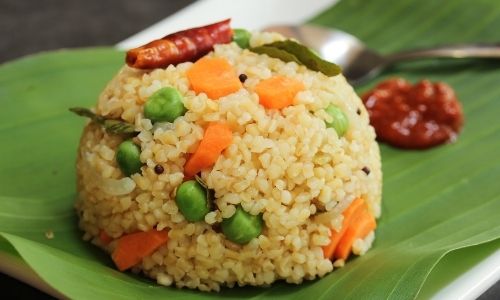
Upma is a popular breakfast option across many Indian households. It also makes for a fulfilling, nutritious snack.
The main ingredient of this Indian food is Semolina (locally known as Sooji). Semolina digests slowly, thus preventing you from over-eating.
Semolina is also rich in Vitamin B (mainly thiamine and folate), which help convert food into energy to keep you sustained through the day.
Add some boiled vegetables to the Upma for a more nutrient-dense and flavorful breakfast experience!
5. Poha
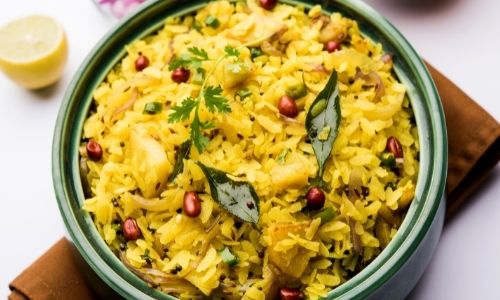
Another popular breakfast or snacking option in Indian foods is Poha.
Like most dishes, Poha is rich in vitamins and minerals, such as iron, Vitamin A, Vitamin C, potassium, magnesium, etc.
Iron helps in blood circulation. Vitamin A and C are rich sources of antioxidants that fight against free radicals in your body.
Potassium improves muscle functioning, whereas magnesium has anti-inflammatory benefits.
Poha is also a gluten-free dish. Therefore, it is easily digestible, especially for those who can not consume wheat.
Like Upma preparations, add your favourite boiled veggies in Poha for added nutrient value!
6. Daliya (Porridge)
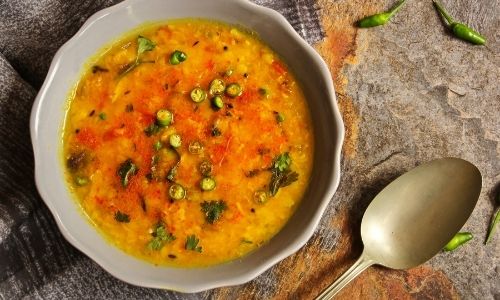
Daliya is an Indian dish prepared using ground wheat, vegetables, and lentils. It is one of the healthiest foods to consume, especially amongst vegetarians and diabetics.
Daliya has a low glycemic index. Foods with a low glycemic index help maintain your blood sugar levels.
Moreover, like Upma, it digests slowly. Therefore, it naturally satiates your body, preventing you from binge-eating in between meals.
Daliya is also rich in proteins and dietary fibres that help muscle building and digestion!
7. Idli
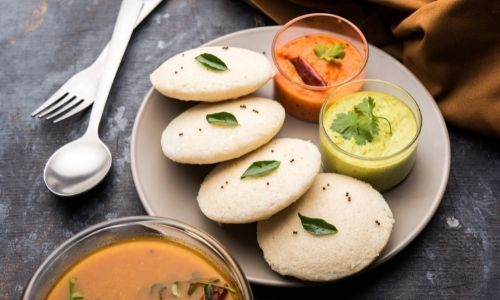
Idli is like a steamed rice cake that tastes amazing, especially when dipped in chutney! To prepare Idli, you need to ferment rice.
However, many Indian households have recently started replacing rice with oats containing fewer calories and carbohydrates.
In addition to rice or oats, lentils are also an essential ingredient in the idli mixture. As mentioned earlier, lentils are rich in protein and iron.
While it is not as nutrient-dense as other Indian foods, it is a better alternative to processed snacks, which are harmful to health.
8. Dahi (Yogurt)
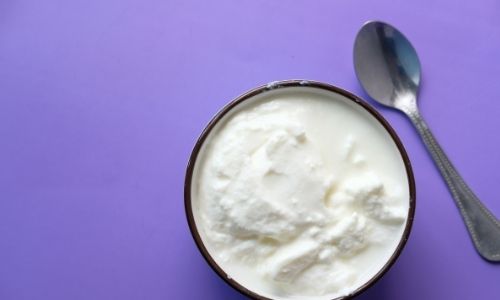
Yoghurt or curd, locally known as Dahi in North India, is one of the best healthy Indian foods to consume.
Dahi is a one-stop solution for any and every digestion-related issue. Moreover, it helps cool the body, which is why most parents and grandparents are adamant about having Dahi during summers!
Curd is also a healthier alternative for curry-based vegetable dishes that require cream.
You can consume curd in its original form, mix it with rice, or add some spices and salt to make buttermilk.
9. Cottage Cheese
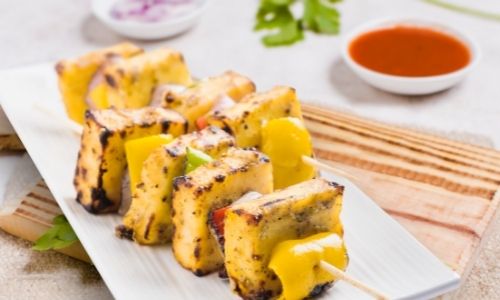
Popularly known as Paneer, Cottage cheese is another protein-rich Indian food, like pulses.
Since Paneer is a dairy product, it has all the benefits of milk in it. However, most people do not know that Paneer also contains a fatty acid known as Conjugated Linoleic Acid (CLA).
CLA helps shed excess fat from our body, making it a healthier Indian food to add to your diet!
10. Dhokla
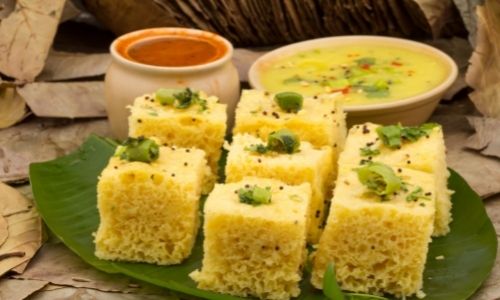
Dhokla is a famous dish from the state of Gujarat. It makes a great snack, especially when teamed with green chutney!
What makes dhokla healthy amongst other Indian snacks?
Dhokla is a low-calorie, steamed Indian food.
The main ingredient is fermented besan, which helps increase the nutrient count of riboflavin, niacin, folic acid, and other Vitamin B forms.
You May Also Like To Read:
Cheap High Protein Foods Sources In India
Healthy Indian Foods To Keep You Warm During Winters
Conclusion
After such a comprehensive list of Indian foods and their benefits, you can not deny that Indian foods are nutritious and good for our health!
It all depends on the kind of ingredients you use, along with your preparation technique.
If you have tried healthy Indian foods and diets, please feel free to share your recommendations and experiences with our readers in the comment box below!
As always, we continue to update our page with informative and insightful articles. In the meantime, you can take this time to try creating one of these dishes and changing your eating habits!

